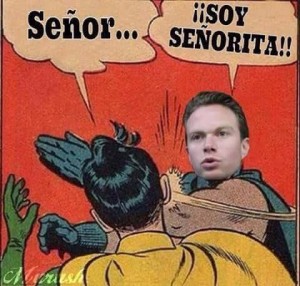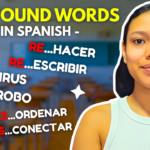
You may remember my recent blog post where I wrote that one thing that always makes me laugh about the Spanish language is how Spanish-speakers add “on” or “ona” to a body part in order to describe someone.
I then gave the following examples by including in the first column the name of the body part, and in the second column the description that you get when you add “on” or “ona.”
“Por supuesto” (of course), “on” is used when referring to a male and “ona” when referring to a female.
cachetes – cachetón(a) – big cheeked
cabeza – cabezón(a) – big headed
nariz – narizón(a) – big nosed
piernas – piernona – big legged
oreja – orejona – big earred
boca – bocona – big mouthed
tetas – tetona – big breasted
ojo – ojón(a) – big eyed
pies – piesón(a) – big footed
mano – manón(a) – big handed
culo – culona – big buttocked
caderas – caderona – big hipped
Well today I have something else to discuss that is related to the above topic. In Spanish, you can also add the ending “ada” or “azo” to the name of a body part to describe a “blow” or “strike” to that body part. Or in some cases, a “blow” or “strike” using that body part.
I have listed some examples:
How To Say Punch In Spanish
puñetazo — punch
puño — fistpalmada – slap
palma – palmnalagada — spanking
nalga — buttockspatada — kick
pata — foot of an animal
(“pie” refers to the foot of a human)codazo — a strike or blow using the elbow
codo — elbowrodillazo — a strike or blow using the knee
rodilla — kneecachetada — slap to the cheeks
cachetes — cheeks

“Cachetes” is the word for cheeks that you are likely to hear used in Colombia and several other Spanish-speaking countries. But in many other Spanish-speaking countries, you are more likely to hear the word “mejillas” used for cheeks. But in most of Latin America, they are familiar with the word “cachetada” (slap).
Here’s another one:
calbazo — smack to the head
cabeza — head
Calbazo is a “paisa” term. That is, a term that is commonly used in Medellin, Colombia.
I saw a funny video on YouTube titled “Calbazo” with a Colombian school kid giving his unsuspecting
friend a “calbazo” to the back of his “cabeza.”
Well I guess whether or not you’ll find it funny really depends on your “sentido del humor” (sense of humor).
By the way, in some cases you can even add “ada” to the name of an object to describe a “blow” or “strike” using that object.
Por ejemplo (for example),
puñalada — stab or stab wound
puñal — dagger or knifeEl detective todavía está investigando el caso del hombre que asestó tres puñaladas a su ex mujer.
The detective is still investigating the case where the man delivered three stab wounds to his ex-wife.


